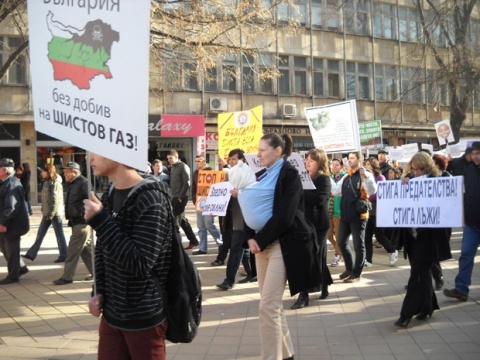Some 200 people gathered on Saturday in Bulgaria’s capital Sofia to protest against the potential shale gas exploration in the country.
The march started in front of the Environment Ministry building in Sofia, passed through the parliament and ended in front of the Ministry of Economy, Energy and Tourism.
The protesters demanded that the controversial hydraulic fracturing technology should be abolished in Bulgaria and called for legislative control over oil- and gas extraction technologies.
Over 10 000 Bulgarian citizens have signed under the demand for a moratorium on hydraulic fracturing for shale gas extraction and research in the country, Angel Slavchev, one of the protest’s organizers, has told dariknews.bg. According to him, the technology is extremely dangerous and may lead to irreversible consequences.
The protesters have so far not succeeded in their efforts to start a dialogue with the government, Slavchev has claimed.
Over 200 citizens from the Northeastern cities of Dobrich and Varna and the town of Kavarna gathered in Dobrich on Saturday to protest against the shale gas exploration that may take place in their region. They came out with a declaration demanding a moratorium on hydraulic fracturing and calling for the end of all shale gas concessions until a law is passed abolishing the technology.
On Friday, Traicho Traikov, Minister of Economy, Energy and Tourism, revealed that the contract with US energy giant Chevron for shale gas exploration and production in Bulgaria, which is still being negotiated, will not be made fully public because there is an element of a trade secret.
He gave assurances, however that talks were underway with the company for making a substantial part of the agreement available to the public.
Traikov explained that the contract would provide for the mandatory submission of a working program for the exploration activities that would be subject to all sorts of administrative checks.
The document would also provide for unlimited liability in the case of environmental damage and the obligation to cover 100% of the cost of eliminating it.


Pingback: Ireland, Bulgaria just say NO to fracking